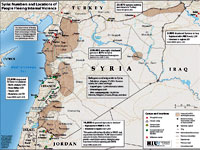U.S.-Russia Deal on Syria Gets Off to Wobbly Start

(Moscow Times – themoscowtimes.com – Yekaterina Kravtsova – September 17, 2013) Two days after reaching a lauded agreement on resolving the Syria conflict, Foreign Minister Sergei Lavrov and U.S. Secretary of State John Kerry have voiced opposing approaches on how the agreement should be implemented.
After three days of talks in Geneva, Lavrov and Kerry framed a plan Saturday that would oblige Syrian President Bashar Assad to reveal his undeclared chemical reserves within a week and surrender all chemical weapons by mid-2014. Much to the relief of the international community, the Syrian government agreed to the terms of the plan.
But at separate meetings Monday, the U.S. and Russia seemed to butt heads, signaling more tense diplomatic negotiations to come after a month of heightened tensions sparked by
an alleged chemical attack in a Damascus suburb Aug. 21. The U.S. said Assad’s government was behind the attack, which it said killed more than 1,400 people, while Russia said the attack was organized by rebels to lure the West into war.
At a meeting with British Foreign Secretary William Hague and French President Fran ois Hollande in Paris on Monday, Kerry said the Geneva agreement must become a UN resolution that would be “as strong and forceful as possible” and would threaten Syria with military action under Chapter 7 of the UN charter if it did not abide by the terms.
“We will not tolerate any avoidance or anything less than full compliance by the Assad regime. If Assad fails in time to abide by the terms of this framework, make no mistake, we are all agreed and that includes Russia that there will be consequences,” Kerry told reporters after the meeting in Paris.
Lavrov, however, who held bilateral talks with Egypt’s Foreign Minister Nabil Fahmi in Moscow on Monday, said that statements about a strong UN resolution were a “distorted reality,” since he and Kerry had already worked out the “exact plan on how to act.”
He said the U.S. and Russia would prepare a plan containing the terms and defining the mechanisms for the Organization for the Prohibition of Chemical Weapons, which would then be in charge of removing chemical weapons from Syria.
“The rush to accept a UN resolution shows that there’s no understanding of the agreement that we reached with John Kerry and a lack of will to read it. First, the Organization for the Prohibition of Chemical Weapons must make a decision,” Lavrov said.
He also said it was time to consider forcing the Syrian opposition, which said it would not participate in talks with Assad, to attend the Geneva-2 peace talks instead of just urging them to do so.
Fahmi, for his part, said he hoped the initiative to make Syria free of chemical weapons would help ensure that the Middle East as a whole was free of weapons of mass destruction.
UN inspectors who investigated the alleged site of the attack in Syria said Monday that they had “clear and convincing evidence that chemical weapons were used against civilians, including children, on a relatively large scale,” The Associated Press reported.
“The environmental, chemical and medical samples we have collected provide clear and convincing evidence that surface-to-surface rockets containing the nerve agent sarin were used … in the Ghouta area of Damascus,” they said in their report.
The report does not draw any conclusions about who carried out the attack, however.
France’s Hollande, a vocal supporter of a military strike against Syria, said France and Britain supported the U.S. push for a UN resolution that would set precise and binding deadlines for the removal of Syria’s chemical weapons, adding that the resolution should specify the terms of military action if Syria tried to avoid its obligations.
Hague said the UN resolution would “crystallize a binding commitment.”
But Lavrov seemed perturbed by such comments.
“Our [European] partners want to again unilaterally review what we’ve agreed on with the Americans,” Lavrov said, adding that he hoped the U.S. would “strictly stick to what has been agreed upon.”
According to Vyacheslav Nikonov, a political analyst and State Duma deputy, the U.S. reaction comes as no surprise, as it is unwilling to play a secondary role in Syria.
“It’s impossible for the U.S. to fully accept the plan proposed by Lavrov, and so it would insist on tough measures, even though it doesn’t have a detailed plan for such measures, except a military strike,” he said.
Yevgeny Satanovsky, head of the Middle East Institute, a think tank specializing in Middle East studies, said the different approaches to implementing the agreement stemmed from the U.S. and Russia having completely different goals in the region, with overthrowing Assad’s regime being the U.S.’s main priority.
The U.S. would likely attack Syria sooner or later, even despite the agreement, he said.
Kerry seemed to lend credence to that notion, saying that Assad had lost his legitimacy and would have to leave power no matter what and that the U.S. remained committed to the Syrian opposition and the Geneva process, which calls for a transition government.
“Nothing in what we have done is meant to offer any notion to Assad that there is some legitimacy to his process, that he has some extended period as a leader,” he said.
